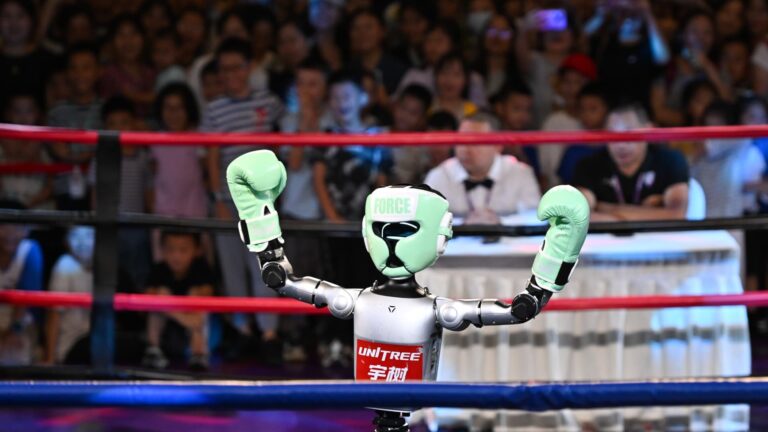Humanoid robot from Unitree Robotics after a boxing match during the World Smart Industry Expo 2025 at Chongqing International Expo Center in Chongqing, China on September 7, 2025.
China News Service | China News Service | Getty Images
Unitree Robotics, one of China’s hottest technology startups, is planning an initial public offering that could value the company at up to 50 billion yuan ($7 billion), and help establish itself as a global leader in humanoid robots.
So-called humanoid robots are artificial intelligence-powered machines designed to resemble humans in appearance and movement, with applications in the industrial and service sectors.
Zhejiang-based Unitree has established itself as a leader in China’s humanoid robot space, and its listing plans could make it one of the first companies specializing in the technology to go public.
The company’s fresh valuation target, first reported by Reuters, citing two people with knowledge of the plans, would mark a sharp jump from its latest fundraising round reported on in June. At the time, the company had attracted major backers such as Geely, Alibaba and Tencent.
Unitree, in a post on its X account on Aug. 27, outlined its plans to IPO, saying that it was actively advancing listing preparations and was expecting to submit the application documents in the fourth quarter of the year.
It remains unclear how much Unitree is seeking to raise in the IPO. The company recently told local Chinese media that it’s been profitable since 2020 and now has revenues exceeding 1 billion Chinese yuan ($140.35 million).
Unitree did not respond to CNBC’s request for comment.
An offering of this size would be one of the largest Chinese tech listings in recent years. The mainland stock market has been gradually reviving following years of tightened regulatory scrutiny and volatility.
Unitree’s listing plan also comes as Beijing steps up efforts to support its local champions in artificial intelligence-related industries. Its founder, Wang Xingxing, was reportedly among a group of tech leaders who attended a rare meeting with Chinese President Xi Jinping earlier this year.
In 2023, China’s Ministry of Industry and Information Technology issued guidelines for humanoid robots, calling for “production at scale” by 2025.
Competition heats up
Unitree is part of a wave of Chinese humanoid robot companies, including Agibot, also known as Zhiyuan Robotics and Galbot, a Beijing-based robotics start-up backed by the Hong Kong government.
These companies have been rushing to get their robots deployed in factories across China. EV makers like BYD and Geely have already reportedly deployed some of Unitree’s humanoid robots at their production lines.
Meanwhile, Chinese humanoid robots have taken center stage in recent publicized events such as the World Robot Conference and World Humanoid Robot Games.
As these companies rush to get their robots deployed in factories across China, an IPO could help Unitree establish itself as China’s leading firm in humanoid robots, according to Lian Jye Su, chief analyst at independent analyst and consultancy firm Omdia.
“Unitree is one of the world’s leading vendors in mobile robots and it will likely be a top player in the humanoid robotics sector,” he said.
According to estimates from Omdia, a total of 15,000 units are expected to be shipped this year, with Unitree’s share second only to its domestic competitor Agibot.
Competition is also heating up internationally. The U.S. has seen its own burgeoning humanoid robot players, such as Boston Dynamics and Figure AI, emerge. However, Tesla’s Optimus appears to be leading the pack in commercial readiness, with CEO Elon Musk previously stating plans to produce about 5,000 units this year.

However, analysts have previously told CNBC that China has established an early lead in the humanoid robotics space in terms of commercial products and pricing.
A research note from Morgan Stanley last month said that the Unitree G1 was likely the most used humanoid robot globally, given its low $16,000 starting price point. Tesla’s Optimus Gen2 humanoid robot is expected to cost at least $20,000.
Meanwhile, Unitree recently unveiled a new humanoid, the Unitree R1, with a starting price of $5,900. According to Morgan Stanley, while these cheaper humanoids may not be the most advanced, they will be valuable for Unitree to collect critical data needed to train its next generation of robot models.
Still, while China may have an early lead in the commercial success of humanoid robots, analysts note that the U.S. has strengths in the broader AI robotics environment.
The U.S. has strong chipset makers like Nvidia and Intel, hyperscalers such as Google and Meta, and robotics software vendors such as Physical Intelligence and Skild AI, which give it an “equally, if not more robust” overall humanoid robot ecosystem, said Omdia analyst Su.
For example, Chinese humanoid robot makers – including Unitree Robotics – have become early adopters of Nvidia’s humanoid robot technologies. That includes Nvidia’s recently released Jetson AGX Thor platform, which enables their machines to have real-time, intelligent interactions with people.
Merrill Lynch analysts estimated in a recent research note that global humanoid robot shipments will reach 18,000 units in 2025 from 2,500 units the year prior. It also estimates a global robot population of 3 billion by 2060.

